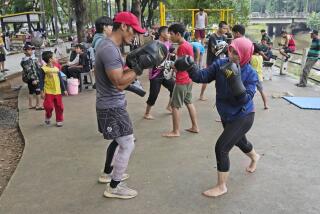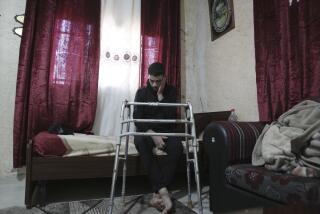Indonesia’s Provincial War Traumatizes Youths
- Share via
BANDA ACEH, Indonesia — Accused of being a spy for Acehnese rebels, 16-year-old Milo Andrian allegedly suffered beatings for days at the hands of Indonesian security officers.
Now he sits motionless in a mental hospital staring vacantly. He no longer recognizes his mother.
In Aceh, Indonesia’s westernmost province, where the government has escalated its campaign against separatist rebels, young people are falling victim to violence by both sides.
A 15-year-old boy recounts seeing three neighbors dragged from a home with plastic ropes around their necks and then shot point-blank by soldiers. “I could see their brains splattered on the banana trees,” he said.
Masked men, most likely rebels, assassinated an orphanage director in full view of its 60 wards. A bullet grazed the rib cage of one of the youths, a teenager who recalls: “I looked down and saw blood seeping through my blouse. My body felt hot all over, and I blacked out.”
Some 12,000 people -- mostly civilians -- have died in the war, which broke out in 1976 after Indonesia’s government refused to give Aceh promised autonomy. Separatism has been an undercurrent in the province since the Dutch invaded the then-Islamic sultanate in 1870.
There have been repeated efforts to settle the conflict. The most recent, a truce mediated in 2002 by the Geneva-based Henry Dunant Center, collapsed in May amid mistrust on both sides.
The national government in Jakarta accused rebels of using the lull in fighting to campaign for independence and to rearm. Rebels complained that the government did not honor promises to withdraw troops.
Authorities have sharply curtailed news coverage and foreign aid work in Aceh since declaring martial law in the province after the failed peace talks. However, an Associated Press reporter was able to interview villagers caught in the cross-fire of Asia’s longest-running war -- and discovered numerous children traumatized by the conflict.
Since the latest offensive began, Aceh’s main cities have regained a semblance of normality, with shootings, bombings and kidnappings on the decline. But human-rights activists fear that the military and police are committing widespread abuses in their drive to root out rebels in the countryside.
By the government’s count, since May, more than 1,000 suspected rebels have been killed in addition to 300 civilians. Rights workers suspect the number of civilian victims is much higher.
No figures are available on the number of children killed and injured or arrested.
Authorities deny allegations that they have tortured minors and insist that they arrest rebels only when there is sufficient evidence.
Some rebels of the Free Aceh Movement admit that they recruit children as young as 13 to smuggle messages, warn fighters when troops are near or carry food to their jungle hide-outs.
The family of Andrian, sentenced to eight months in prison for treason, insists that he did none of that. They described his trial as a farce in which no witnesses were brought to court. He confessed to giving information to the rebels only after being tortured, they said.
“He couldn’t stand the beatings anymore, and he changed. His gaze became blank. He didn’t know who I was,” his mother, Asbuni, told Associated Press at the mental hospital where Andrian was taken in early November.
Asbuni, 43, said she visited him in a jail cell and saw dried blood and knife marks on his face. His legs were black and blue from beatings, she said.
Asbuni, a teacher, said she feared that her son would be sent back to jail to serve the remainder of his sentence, which ends in February.
Aceh’s military commander, Maj. Gen. Bambang Darmono, said he knew of no cases of soldiers violating the rights of minors. “I always tell my soldiers: Never torture children and women,” he said.
In a surprising admission, however, he said beating suspected rebels was acceptable as long as they were not seriously injured.
“For example, my soldier slugs a suspect across the face. That’s no problem, as long as he is able to function after the questioning.”
But, he added, “if it’s gross torture which causes someone to be incapacitated -- that’s a no-no.”
Many people fear the plight of civilians in Aceh will worsen as a result of the government’s decision Nov. 6 to extend martial law for six more months.
“Andrian is only one tragic victim of this long-running war,” said Dr. Kris Wardoyo, a psychiatrist who has been treating him. “The conflict is breeding hatred and hostility in the next generation, and the cycle of violence continues.”
The 15-year-old boy who told of seeing his neighbors dragged out by soldiers, kicked and shot said he thought that only one of the three victims belonged to the Free Aceh Movement.
“The soldiers sprayed bullets in their heads at close range, yelling: ‘You rebels! You rebels!’ ” said the youth, who asked not to be quoted by name for fear of reprisals from the military.
His story was corroborated by about 30 people in his village. The youth, they said, stood closest to where the shooting took place.
The teen who was wounded at the orphanage, Mariati, a small, wispy 18-year-old, said she still had nightmares about the masked men who showed up in September and fatally shot the director, Tengku Zakaria.
Mariati said she was sitting just six feet away when a bullet grazed her ribs. “I woke up four days later in hospital, aching pain all over my body,” she said.
Most of the children at the orphanage in the village of Usi Daya had been taken in by Zakaria after their parents were killed during the war. Many had witnessed their parents’ shootings.
Villagers, who asked to remain anonymous for fear of reprisal from the rebels, said insurgents had demanded money from Zakaria and threatened to kill him if he refused to pay.
Aceh’s cities are calmer since the government offensive began, but suspected kidnappings by security forces underline the lawlessness that has fueled the conflict.
In the district capital of Bireun, six young men, ages 17 to 22, disappeared in November when they set out on new motorbikes to cruise the town.
“I am sure rebels did not kidnap them, and they didn’t run away from their families,” said Anwar Yusuf, a legislator who is also their neighbor. “Which rebel would dare to come to this town? It’s heavily guarded by the police and under military control.”
An uncle of one of the missing, who refused to be named, said he suspected that the young men were taken because police wanted to steal their motorbikes -- a charge that the police deny.
The conflict in Aceh has long been muddied by gun- and drug-running, extortion, kidnapping and other common crimes committed by both rebels and authorities.
Most Acehnese support independence, but many are not enthusiastic about the rebels and their violent tactics. They want the government to allow a referendum similar to the U.N.-monitored vote in 1999 that led to independence for the province of East Timor.
“We are squeezed from many sides,” said Yusuf, the legislator. “Military operations are one way of stopping violence from the rebels, but we feel that true, lasting peace is a long, long way off.”
More to Read
Sign up for Essential California
The most important California stories and recommendations in your inbox every morning.
You may occasionally receive promotional content from the Los Angeles Times.













